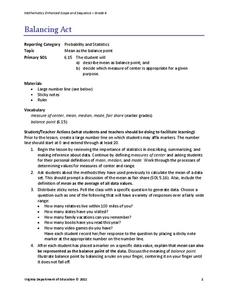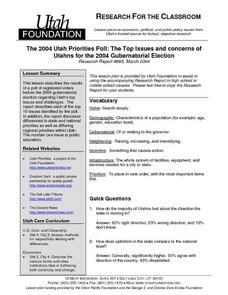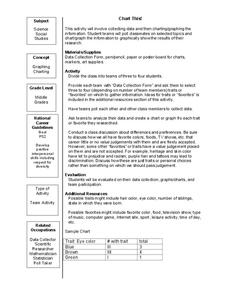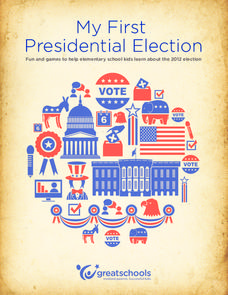Center for Civic Education
The Culminating Activity: Simulated General Election
What does a polling place look like, and what do poll workers do? Learners take what they have learned about voting procedures and role-play as poll workers in a simulated election activity.
Center for Civic Education
The Culminating Activity: Simulated Election: Initiatives
In part two of an election simulation, pupils practice actually casting their votes in a simulated polling place in order to prepare for this real-world democratic experience.
Curated OER
Magnetic Polls
Students explore the New Hampshire primaries and the polling process by analyzing polling information, examining the effects of polls, and creating graphs that represent polling data.
Curated OER
Qualifying to Vote Under Jim Crow
Literacy tests, poll taxes, grandfather laws? Scholars study the systematic ways African-Americans were kept from voting even after it was made a law. They analyze a series of primary source documents, complete a worksheet, and engaged...
California Academy of Science
Kinesthetic Astronomy: The Meaning of a Year
How many times have you traveled around the sun? Aspiring astronomers grasp what a year is and they differentiate between orbit and rotation by walking around the sun right within your classroom. Place a lamp in the center of the room to...
Virginia Department of Education
Balancing Act
How many different interpretations of the mean are there? Scholars place numbers on a number line and determine the mean. They interpret the mean as the average value and as the balance point.
C-SPAN
Electoral College Pros/Cons and Alternatives
If every vote counts, why do we need the electoral college? Middle and high schoolers study the Constitutional precedent of the electoral college, as well as its place in historical and modern elections, with an engaging social studies...
Agriculture in the Classroom
Understanding the Columbian Exchange Through Old World and New World Foods
If you're interested in teaching your class about the impact of the Columbian Exchange on contemporary society, this is worth a look. The plan begins with an introduction to the topic, which stems from a cell phone poll...
Curated OER
Youth voters and election turnout
Students investigate why 18- to 24- year-olds have a low turnout at the polls. Students develop a plan to encourage young Americans to vote, or write a persuasive essay telling why they should vote.
Curated OER
Introduction to Graphs
Students poll classmates to gather information for a graph. They identify three types of graphs (bar, line, table). Students create each type of graph using data gathered from classmates.
Curated OER
American Political Culture
Examine American political culture with your scholars using this self-assessment instructional activity. Individuals rate a list of 14 values from highest to lowest, including ideas such as financial security, right to private property,...
Curated OER
Which Has The Most?
Learners are part of a class poll where they choose their favorite food and their favorite toy. For this which has the most lesson, students are given a block to represent their choice. Learners then place the block by the picture of...
Curated OER
Class Actions
Learners examine the many facets of the term "class," defining the term and exploring some of the ways that class plays into life in American society. They participate in a poll about class-related issues.
The New York Times
Dark Materials: Reflecting on Dystopian Themes in Young Adult Literature
The Hunger Games. Maximum Ride. Why is so much of young adult literature so dark? What is the appeal of dystopian literature to young readers? The six activities in this resource ask kids to reflect on some of the reasons this genre has...
Curated OER
How Do You Like Your Eggs?
First graders conduct a poll about how people like their eggs. In this graphing instructional activity, 1st graders collect data about how they like their eggs. Students use a picture of themselves to place under the type of egg they...
Curated OER
The 2004 Utah Priorities Poll
Students participate in a lesson that focuses on a state survey for Utah. The survey is intended to find the public opinion of how the state is doing in the public eye. They analyze the survey and create their own to research the status...
Deliberating in a Democracy
Recycling
How often have you passed by a recycling container in your school? Scholars research the issue of recycling in the ever-changing global world. Using documentation and video evidence, they form their own opinions on recycling and how it...
Curated OER
Chart This!
Students collect data and graph or chart the information. In this data organization activity, students poll their classmates about certain topics and chart or graph the information to show the results of their research.
Curated OER
Do You Like to Spend or Save?
Students, after briefly discussing spending and saving habits, take a poll to see how their peers like to manage money. Then students graph their findings and discuss the survey results.
Curated OER
History or Mis-story?
Students explore some of our country's founding myths and legends by participating in an online poll. For example, did George Washington really chop down a cherry tree, then confess to his father about the deed, saying, I cannot tell a lie?
Curated OER
State of Oregon v. Dominguez-Martinez
High schoolers are introduced to the concept of racial profiling. In groups, they analzye the case between Oregon and Dominguez-Martinez and evaluate the use of racial profiling as a tool of policemen. They also discuss the laws in place...
Curated OER
Constitution Day: The 1965 Alabama Literacy Test
Tenth graders examine the United States Constitution. In this American Government lesson plan, 10th graders read excerpts from President Johnson's speech to Congress and parts of the Voting Rights Act of 1965. Students research other...
Curated OER
May The Best Character Win
Students examine the financial committment to running a campaign. They discuss the difference between electroal and popular votes. They realize how involved a political campaign is!
Great Schools
My First Presidential Election
Register, establish a platform, make campaign speeches, and design campaign advertisements with a study of presidential elections. Young citizens engage in various activities that mimic the election process.

























